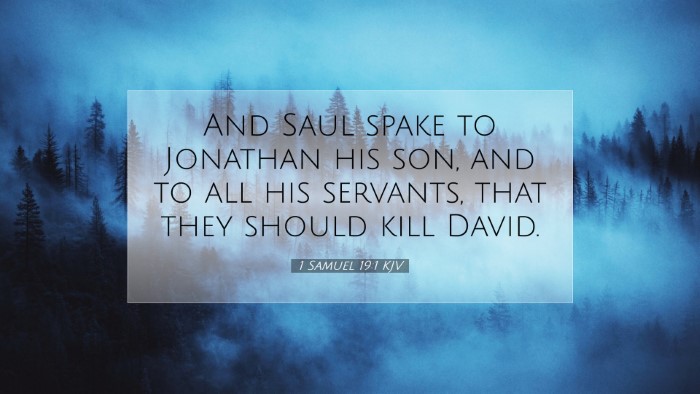1 Samuel 19:1 - Commentary
Verse: "And Saul spake to Jonathan his son, and to all his servants, that they should kill David."
Introduction
The narrative of 1 Samuel 19:1 unveils the mounting tension between King Saul and David, showcasing the darker dimensions of Saul's character as jealousy and fear propels him towards treachery. This verse acts as a critical pivot, encapsulating the state of Saul's mind and the precarious position of David.
Contextual Background
In prior chapters, we observe David’s rise to prominence following his victory over Goliath and subsequent popularity among the people of Israel. The intricate relationship between David and Jonathan, Saul's son, is also established, setting the stage for the tragic conflict that follows.
The Character of Saul
Saul’s declaration in this verse reveals his internal conflict and descent into paranoia:
- Jealousy and Insecurity: According to Matthew Henry, Saul's jealousy is a manifestation of his fears regarding his kingship and future. Saul perceives David as a usurper threatening his throne rather than a loyal subject.
- Manipulation: Adam Clarke notes that Saul's call for the death of David indicates a deep moral decline. He was not merely a ruler but also a father, illustrating his willingness to sacrifice familial bonds for power.
Jonathan's Response
While the verse does not explicitly recount Jonathan’s actions, historical context demonstrates his loyalty to David:
- Friendship and Covenant: Jonathan's friendship with David, rooted in a covenant of loyalty, symbolizes the spirit of sacrificial friendship against Saul’s treachery.
- Conflict of Loyalties: Jonathan finds himself torn between his allegiance to his father and loyalty to David, foreshadowing the personal conflicts that arise amidst political turmoil.
The Role of Servants
Saul's command to his servants also hints at the broader implications of loyalty and duty:
- Power Dynamics: As noted by Albert Barnes, Saul's order reflects the hierarchical structure of authority where subordinates are coerced into complicity. This highlights the theme of moral courage versus blind obedience.
- Community Impact: The call to kill David is not just a personal vendetta but a reflection of the pressures placed on those in proximity to power. The servants represent the collective conscience of society faced with ethical dilemmas.
Theological Implications
The implications of this verse transcend its historical setting; they resonate with themes of sin, betrayal, and divine providence:
- Human Nature: The human propensity for jealousy and fear, evident in Saul’s actions, serves as a cautionary tale about the destructive consequences of unchecked emotions.
- God's Sovereignty: As the narrative unfolds, it becomes clear that God’s plan will ultimately prevail, regardless of human opposition. This serves as a testament to the divine assurance amidst turmoil.
Conclusion
The drama encapsulated in 1 Samuel 19:1 serves both as a historical account and a moral lesson relevant across generations. For pastors, theologians, and students, it is a sobering reminder of the complexities of loyalty, the perils of envy, and the overarching sovereignty of God amidst human struggles.
The narrative compels deeper reflection on our personal conflicts of loyalty, the ethical implications of our responses to authority, and the nature of true friendship that stands amid adversity.


